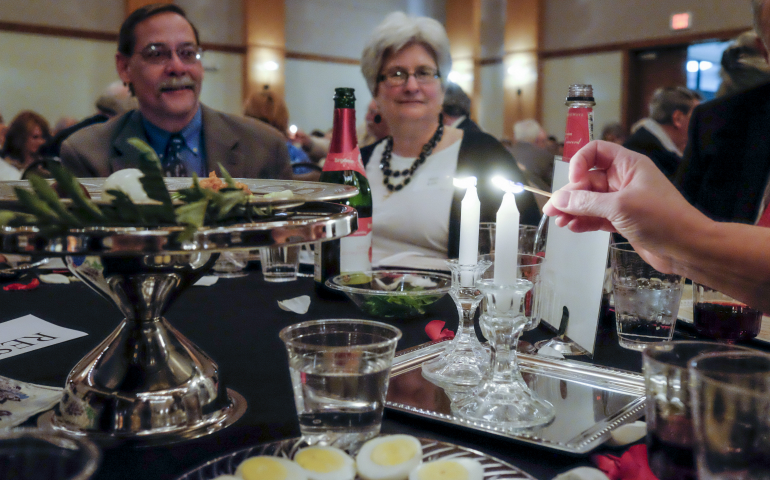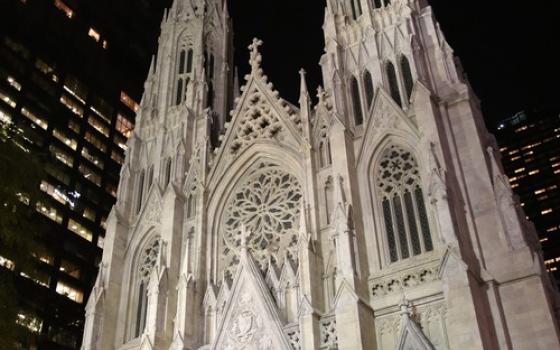
The Jewish Federation of Nashville and Middle Tennessee light candles April 12 at a community relations Seder at the Gordon Jewish Community Center in Nashville. The organization invited members of the local Catholic community to take part. (CNS photo/Rick Musacchio, Tennessee Register)
Two rabbis have written a provocative article about the role of the Passover Seder meal in Christianity. At first blush it seems they are saying there is no role, and Christians disrespect Judaism by trying to celebrate this Jewish tradition. The notion appears to undercut efforts at greater ecumenical understanding.
Actually, the article provides an important contribution to Jewish-Christian understanding. The article begins with the assertion that Jesus did not eat a Seder meal and neither should Christians. It is certainly true that Jesus did not celebrate an authentic Seder meal, because there was no such thing in first-century Judaism. Jesus definitely commemorated Passover at the Last Supper, but as the rabbis point out, the current Seder ritual was only fully developed, "at least two generations after Jesus." It could also be noted that there remains disagreement as to whether the Last Supper took place on Passover, as the synoptic Gospels recount, or the day before Passover, as in the Johannine account.
In any case, it is also true that greater attention and interest in Judaism and Passover has developed in Christianity relatively recently. Rabbis Yehiel Poupko and David Sandmel both agree this interest is a good thing. They see it as an "opportunity to use the Passover/Easter connection to teach Christians about Judaism." Thus, it was meant to promote "interreligious and historical understanding." However, the rabbis contend that this "well-intentioned" effort has gone too far.
So why has this greater interest in Judaism developed? Poupko and Sandmel mention a few possible reasons. A Jewish-Christian dialogue developed after the events of the Second World War. Christians wanted to better understand the Jewish background of their faith. There has been an increased awareness of the Jewishness of Jesus. Many Christians want to be able to do what Jesus did. Thus, there was a desire to experience a Passover meal like Jesus. I would add to these reasons the work of the Second Vatican Council, which jumpstarted the Jewish-Christian dialogue among Catholics.
So what does this article see as the problems with Christians celebrating the Jewish Seder? The authors carefully describe the differences in meaning of the Jewish Passover and the Last Supper of Jesus. Both events launch a new religion. Yet, to appropriate Passover as Christians, and in so doing distort its meaning for Jews is not respectful of that religion. It shows a misunderstanding of both faith traditions.
This fact strikes a chord for me in that I remember many years ago speaking of Jesus to Jewish friends in context of fulfilling Old Testament prophecies. While they did not seem to take offense, it was certainly inappropriate as a way of promoting greater understanding. The rabbi authors are correct when they say good relations can start "with acknowledging common principles but also demand a clear articulation of the profound differences that separate them."
It is important to understand that the article is not disinviting Christians from celebrating a Passover Seder meal with any Jewish family. The desire to experience important moments in another's faith is a constructive thing. It is a reminder to me of how many Protestants would visit Catholic churches for midnight Mass at Christmas. It is quite another thing, however, for Christians on their own to celebrate a Passover Seder meal and in the process distort its Jewish meaning and Christianize it for their own purposes.
The Jewish-Christian dialogue has come a long way. As we celebrate our respective feasts of Passover and Easter at this time of year, our mutual respect for each other's faith traditions should be at the forefront of our relationship. Yes, we are rooted in the same history. The earliest Christians were very Jewish in practice and belief. We retain many of the same values and understanding of God and religion. Yet we have diverged in many important ways. We best honor both of our traditions by acknowledging what we have in common and respecting the uniqueness of each tradition.
I am reminded of my favorite childhood radio program, "Big Jon and Sparkie." Yes, I do remember radio. Every Saturday morning, they would end their program by saying, "You go to your church, and I'll go to mine, but we can all walk along together." They should have added temple or synagogue, but I believe the sentiment still applies.




